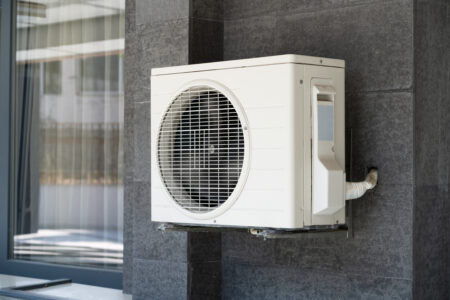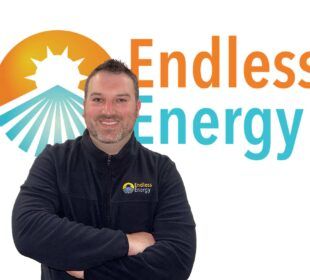Heat pumps are becoming increasingly popular as an alternative to traditional central air conditioners. One reason is that heat pumps are energy efficient and capable of effectively keeping a home fully cool on even the hottest summer days. That said, the main advantage is that heat pumps are also an efficient and effective option for heating a home in winter. Here, we’ll tell you all you need to know about heat pumps, how they compare to traditional air conditioners and why installing one for your home is such a smart investment.
An Overview of Heat Pumps and How They Work
Heat pumps cool (and heat) using a process known as thermal exchange or heat transfer. That means that they absorb or remove heat from the air in one location and then transfer the heat and release it into the air in another location. When running in cooling mode, the heat pump draws heat out of the air inside the home to quickly lower the indoor temperature. It then transfers the heat outside and releases it.
As with any other type of cooling system, a heat pump uses a type of refrigerant or coolant to capture and transfer heat. The interior part of the system consists of the blower or air handler and the evaporator coil. The blower is what brings warm air into the system and then pumps the cool air back out into each room. When the warm air moves over the evaporator coil, the refrigerant absorbs much of the heat from the air. This process happens naturally due to the fact that the refrigerant getting pumped through the evaporator coil is so much colder than the air.
As the refrigerant absorbs heat, its temperature obviously quickly increases. That means you always have cold refrigerant getting pumped inside and hot refrigerant flowing back outside to the heat pump. When the refrigerant enters the heat pump, it gets compressed. This essentially causes it to boil and instantly change from a liquid state into an extremely hot gas. After getting compressed, the refrigerant then flows through the condenser coil in the heat pump. As the heat pump’s fan draws air in and blows it over the condenser coil, heat flows out of the refrigerant and into the air. This process again happens naturally since at this point the air blowing over the coil is colder than the refrigerant.
As the heat flows out of the refrigerant, it results in it again changing back from a gas into a liquid. At this point in the process, the refrigerant is still fairly warm when it leaves the heat pump and gets pumped back inside. This is where the expansion valve comes in. This valve is located on the refrigerant line just in front of the evaporator coil. The pressure of the refrigerant decreases as it flows through the expansion valve. This instantly makes it cold enough that it can again absorb additional heat as it flows through the evaporator coil.
Comparing Heat Pumps and Central AC Units
The process we just described is also exactly how central AC units work. That means that there isn’t much of a difference between heat pumps and air conditioners in terms of how they work and how effectively they cool. That said, many heat pumps are at least slightly more energy efficient and have a higher cooling capacity than many AC units on the market. However, it really depends on which models you’re comparing and what their SEER ratings are.
In addition to energy efficiency, other factors you should consider when deciding between a heat pump and an air conditioner are the upfront costs and life expectancy. Both of these areas are where air conditioners have an advantage since they are a bit less expensive. They also will often last a few years longer than heat pumps. On the other hand, heat pumps have the advantage of also being able to heat your home in winter whereas air conditioners can obviously only cool. This is the main difference between the two since heat pumps have a reversing valve that enables them to reverse the refrigerant flow within the system. That means the refrigerant pulls heat out of the air outside and brings it inside to raise the home’s air temperature.
The fact that a heat pump can also provide heating means that simply comparing the upfront costs between a heat pump and an air conditioner doesn’t provide the full picture. Instead, you’re better off comparing the cost of installing a heat pump versus installing an air conditioner and a furnace or other type of heating. In this case, a heat pump is always going to be the least expensive option.
How to Choose the Right Heat Pump for Your Home
When deciding which heat pump you want to install, you’ll need to choose between a single-stage, two-stage or variable-speed unit. A single-stage unit will always be the least expensive option, but a two-stage or variable-speed unit will use far less electricity and work much better at keeping your home consistently cool.
The compressor in a single-stage heat pump only has one speed, which means it pumps the refrigerant through the system quite quickly so that the system cools quickly. The problem is that it leads to the temperature in the home continually fluctuating between warmer and cooler since the heat pump frequently cycles off and on.
Two-stage and variable-speed heat pumps are much more energy efficient and provide more consistent, even cooling throughout the home. The compressor in a two-stage unit can run at full speed during times when more cooling is required, but it can also slow down to where it only runs at around 60-70% of its full speed. The unit will typically end up operating at the lower speed around 80% of the time to greatly reduce its energy usage. Cooling at a lower speed also enables it to distribute the cold air throughout the house more evenly to eliminate any hot spots. A two-stage unit also won’t shut off as often, which helps to prevent the temperature in the house from fluctuating nearly as much.
The compressor in a variable-speed heat pump can run as slow as around 25-30% of its full speed, and it can continually adjust its speed in 1% increments as needed. In most cases, a variable-speed unit will stay on almost continuously and only rarely ever shut off. By continually adjusting how quickly or slowly it cools, the unit is able to always keep the temperature in the home within one to two degrees of the thermostat setting. It also does this while using much less electricity than either a single-stage or two-stage heat pump.
Your Trusted Heat Pump Experts
With more than four decades of experience, Endless Energy is the company you should turn to if you want to install a heat pump for your home or commercial building. We offer a range of efficient central heat pumps and mini-split heat pumps from top brands like Bryant, Bosch, LG and Mitsubishi. We can help you decide which type and model is the best choice. We proudly serve customers in Marlborough and throughout most of Massachusetts and are ready to take care of all of your air conditioning, heating and plumbing needs. For more information on the benefits you can get by installing a new residential heat pump or a commercial heat pump, contact us today.



